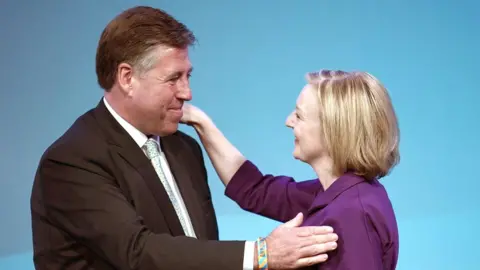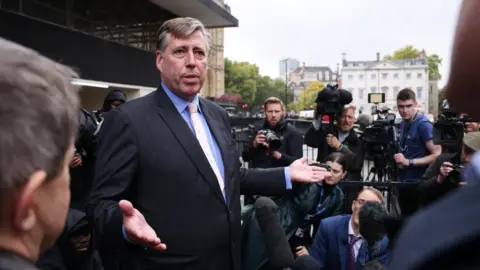Graham Brady: The man who sees off Tory prime ministers
 Getty Images
Getty ImagesHe's the man whose visits to No 10 have spelled the end for the UK's most recent prime ministers.
When Sir Graham Brady was seen walking into Downing Street earlier, speculation hit a new high that Liz Truss's time as PM might be up.
As chairman of the influential 1922 Committee - a group of backbench Tory MPs - Sir Graham is in charge of gauging how unhappy Conservative MPs are. We've heard a lot from him this year when he was organising the last leadership election. Now, with another race about to begin, we can expect to see even more of him.
But who is Sir Graham?
Born in Salford in 1967, Sir Graham first became active in the Conservative Party aged just 16 when - as a grammar school pupil - he joined a campaign to save local grammar schools.
He went to Durham University where he studied law, and later had jobs at think tank the Centre for Policy Studies, in public relations and later as public affairs director at a law firm.
In 1997 - shortly before his 30th birthday - he was elected MP for Altrincham and Sale West in Greater Manchester, making him the youngest Conservative MP at the time. In his maiden speech, he outlined his passion once again for grammar schools.
He went on to serve as a party whip - the MPs who are in charge of party discipline, for example by making sure other MPs attend Parliament and vote along party lines. And his star rose as he served as a shadow education minister and parliamentary private secretary to then-Tory leader Michael Howard in 2003.
Brexiteer Sir Graham served as Europe minister under David Cameron but quit in 2007 over grammar schools - that issue again - after Mr Cameron opposed them.
It was in 2010 that he was elected chairman of the 1922 Committee, a role he's held unchallenged for the past 12 years, being what the Times describes as "a cautious, stolid, unhysterical figure". The group - known in Westminster as the "men in grey suits" - meets weekly.
Sir Graham - who is married with two grown-up children - was knighted in 2017.
"For a family that came from terraced houses in Salford... I think my [late] mother would have been thrilled so I wish she was here to see it, " he said at the time.
But it wasn't until more recent years that Sir Graham became something of a household name.
In 2018, as Theresa May's premiership began to crumble, it was Sir Graham's job to count the letters from Tory MPs expressing their lack of confidence in the PM. It's a number he keeps secret until 15% of Tory MPs have put in letters, the crucial number needed to trigger a vote of no confidence.
He doesn't even share the number with his wife, Victoria, who he employs as a parliamentary assistant.
But he constantly gets asked how many there are, he said at the time. "I get asked it in the supermarket, I get asked it walking down the street... I've become very nervous about counting or saying numbers in case people think I'm referring to something that I'm not."
Sir Graham sees it as his duty to convey his members' views to the prime minister "in the manner of a polite but implacable shop steward", writes the Conservative Home website, which describes him as a sincere and vigilant man.
For a moment after Mrs May quit, Sir Graham briefly considered standing for PM himself. He even briefly resigned as 1922 chairman so he could launch a bid, but in the end decided against it.
During the Covid pandemic, he was vocal in his opposition to further national lockdowns and the government's use of emergency powers.
His influence carries such weight that one Downing Street aide once warned Boris Johnson against meeting Sir Graham alone, according to the Times.
By June this year, Sir Graham had in fact become a problem for Mr Johnson, when the threshold of letters of no confidence was again reached. Mr Johnson survived the vote, but later quit after a wave of resignations from his government.
During the leadership contest this summer, Sir Graham delivered regular updates as the candidates were whittled down. It was he who announced Ms Truss's name and hugged her onstage six weeks ago. And it was he who visited her at No 10 on Thursday for talks, where it became clear she could not hope to carry on.
Sir Graham said the leadership election process will be finished by 28 October so the new leader - Sir Graham's fifth Tory prime minister since being 1922 chair - can be in place in time for the crucial financial statement on 31 October.
 Getty Images
Getty Images